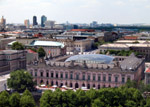|
Editor's
note: Welcome to the Global Health page. The purpose of this feature is
to raise awareness of global health issues with an academic spirit to
help improve the quality of care provided to patients. E-mail
globalhealthnews@musc.edu.
by Julia Kuhnert
Biochemistry &
Molecular Biology
 The Unter den
Linden is a boulevard in the Mitte district of Berlin, the capital of
Germany. It is named for its linden (lime in British English) trees
that line the grassed pedestrian mall between two carriageways. In the
background is the Potsdamer Platz. There are more than 82 million
people living in Germany. The Unter den
Linden is a boulevard in the Mitte district of Berlin, the capital of
Germany. It is named for its linden (lime in British English) trees
that line the grassed pedestrian mall between two carriageways. In the
background is the Potsdamer Platz. There are more than 82 million
people living in Germany.
The Federal Republic of Germany, a federal parliamentary republic of 16
states, is located in the heart of the European Union and holds a key
position in European affairs. It is recognized as a scientific and
technological leader in various fields.
Germany implemented the
first welfare state in the 1880s and even now has a comprehensive
system of social security that is based on the legislation passed by
Otto von Bismarck in the early 1880s. Every political party was
involved and agreed on this important program that Bismarck started.
Bismarck declared that the complaint of a worker was the insecurity of
his existence concerning his job stability, his health and the
incapacity of work due to a prolonged illness or to age.
Ever since, even during
both world wars, the government has been working on adapting and
improving the social system. The state presents the general framework
that has to be met by health insurance companies. Every citizen is
compulsorily insured, without discrimination between chronic disease
patients and healthy people. Germany has a “worry free” health system,
where patients have their choice of a physician and the insurance
company handles the rest.
Employees and employers
equally share the cost of health, disability and accident insurance.
The health insurance contribution is a fixed percentage of the income.
As an emergency response to the recession, the employee’s proportion of
those insurances was raised to 15.5 percent, which is a historical
maximum rate. In 2010, the grievances and concerns of employees
reflected not only the recession and the high taxes in Germany, but
also the high costs of health, disability and accident insurance.
Fortunately, the economy
is picking up now and the government is expecting to reduce the
contribution by next summer to relieve citizens from the currently high
payroll deductions.
Facts about Germany
- There are more than
82 million people in Germany.
- Germans have kept 31%
of the country covered with forests and woodlands.
- The world’s most
colorful caves (as per Guinness Book of Records), Fairy Grottoes, are
in Germany.
- Germany is the only
European country that has no overall speed limit on the highways. The
so-called Autobahn is the oldest, and one of the densest, motorway
networks in the world.
- Berlin became home to
the biggest train station in Europe in 2006.
- Germany is the
homeland of numerous renowned scientists and theorists. They include
Albert Einstein, Max Plank and Werner Heisenberg.
- Germany is a leader
in garbage separation. More than 80% of paper and glass is recycled.
- The work week in
Germany actually includes Saturdays but not for people who work for the
state or a state-related institute.
- Germany became the
world’s first country to adopt daylight saving time, in the year 1916.
- Dogs are treated like
kings. They can go anywhere.
International Events
Sweet and Savory
Bake Sale
11:30 a.m. to 1 p.m., Friday, Dec. 3 at the university hospital and
Colbert Education Center & Library lobby A bake sale will be held
to benefit the Hope Lodge and other community outreach initiatives. For
information, call Rebeca Mueller at 79-2156.
International
Holiday Festival of Lights
Saturday, Dec. 11 The bus will
leave from the corner of Doughty and Courtenay bus stop (in front of
the Strom Thurmond building) at 6:30 pm.
Hope Lodge Dinner
5 p.m., Thursday, Dec. 16
Visit http://www.musc.edu/international
or
Facebook: MUSC International Programs
Friday, Dec. 3, 2010
|



